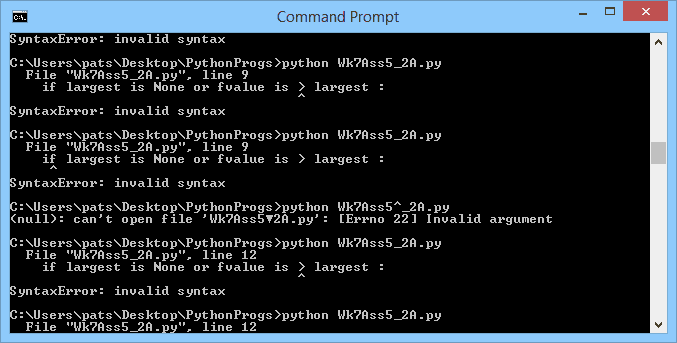I Don’t Want to Become a Programmer
I have decided I don’t want to become a programmer, but the sense of achievement after finishing a challenging course is wonderful.
A few months ago, I was nearing 100 online courses. I wanted the last few courses to be meaningful. I didn’t want to just zoom through a few more short biology MOOCs that wouldn’t take me much time or effort.
What Courses to Try?
For years, my husband has suggested I try my hand at programming. Throughout his career in statistics and biometrics, he has done quite a bit of programming, in several programming languages. He has completed a few Python MOOCs and browsed many others. I’ve seen him wrestle with programming problems from time to time. The thought of trying programming was both fascinating and daunting for me.
I also wanted to attempt Introductory Human Physiology again. I had tried this MOOC back in 2013 when the exams were closed-book format with a pass mark around 75%. Three exams during the course covered three or four week’s work each. The closed-book was on an honour basis; unlike online proctored exams, the webcam wasn’t watching.
In 2013, I hadn’t needed to remember material in so much detail since around 40 years previously. I worked through the first three weeks, filled a 96-page exercise book with notes, tried the weekly practice tests and sat the exam. I failed. Not by much, but enough to know that I needed to spend more time understanding and memorizing the course material. I dropped the course.
By 2018, the course had been, in my opinion, dumbed down somewhat. Instead of three large exams, there are now ten weekly quizzes. There is no mention of the closed-book requirement. The pass mark is 70%. And, instead of only two or three attempts, students can now have a try every eight hours up until the final course deadline. If you miss the deadline, Coursera gives you the option to transfer your progress to the next run of the course.
I watched the Week One videos which appeared to be the same as in 2013 (after all, our physiology hasn’t changed much in the last few years), took a fresh bunch of notes, passed the Week One practice tests, and failed the first quiz.
Time to Re-evaluate
I could have just re-sat the quiz over and over again until I made a pass mark. But I wanted to complete the course, not just select the right answers in the quiz after 85 attempts. I decided to put the course on hold again until I could make the time to really get my teeth into the material. Maybe one day I will manage to learn a decent amount of physiology.
Around the same time, I tried a few programming courses. I finally settled on Programming for Everybody (Getting Started with Python) which has literally thousands of 5-star reviews on both Coursera and Class Central. I worked through the first three weeks, up until the first assessment item. You have to sign up for a certificate to access the Coursera assessments, although I realized later that you may be able to access them for free on a linked site.
And Now For Something Completely Different
Meanwhile, I had become engrossed in How to Make a Comic Book, which I found surprisingly interesting. As you can see from previous posts, I both enjoyed this course and found it a challenge. It also took me far longer to complete than I expected. After finally finishing my comic book, I went back to the Python course.
By this time, I had been away from it for so long that I needed to review all the videos and re-read the course readings. I found the exercise book that I had started a few months earlier and went through my notes. I watched most of the videos at 1.5X speed.
Then I bit the bullet and signed up for a certificate. Even though I had previously selected the audit the course link, Coursera did not bill me until 7 days after signing up for a subscription. I could try assessments then cancel my subscription if I wanted to.
Programming assignments were challenging. Being keen to do the work myself, without my husband’s assistance, I declined his offers to help.
I couldn’t believe how easy it was to make mistakes. I took ages trying to understand what I had to do and how to do it. Then I took all day and more writing and debugging each simple program. I re-watched videos and read and re-read the course textbook (a free PDF is available). I trawled the course discussion forums. Meals came out of cans and the freezer. Housework was ignored. In the end, my husband was almost as happy as I was when I finally finished. Maybe happier, because I felt like I’d been through a wringer.
I have decided I don’t want to become a programmer.
A Final Thought
The sense of achievement after finishing a challenging course is wonderful.
This review was first published at Online Learning Success








Odirile
This was such a lovely read.
I’m struggling to decide on a course because I fear “wasting” time and I’m not sure which career path I’d like to follow so this was fresh.
I can just hop in and see what can be done. I doesn’t always have to work out in a grand “life changing” way.
Thank you.
Muhammad Zawawi Bin Manja
LOL. Programming is hard because you need patient to solve the bug or find the error. If you dont pass this trial , better give up. It will give more stress and headache to all people. Btw I am a programmer